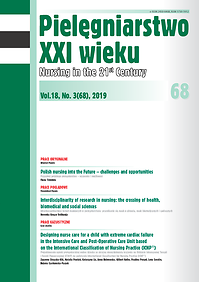Critical thinking as an indispensable component of the Polish nurses’ education process and a necessary condition for the development of nursing
DOI:
https://doi.org/10.2478/pielxxiw-2019-0020Keywords:
critical thinking, education, innovation, process, autonomyAbstract
CRITICAL THINKING AS AN INDISPENSABLE COMPONENT OF THE POLISH NURSES’ EDUCATION PROCESS AND A NECESSARY CONDITION FOR THE DEVELOPMENT OF NURSING
Introduction. The changing reality, the interpenetration of cultures, progress in the field of science, the development of technology, the emergence of unprecedented needs, challenges from the civic health care system require nurses to accurately interpret the essence of phenomena and respond appropriately to the ongoing transformations. Therefore, the education process should not only convey the latest knowledge, stimulate self-education, prepare for conducting comparative and application activities, but also educate specific thought habits called critical thinking, as it is the opposite of routine, schematism or imitation.
Aim. Understanding the specifics of critical thinking. Providing several concepts of critical thinking. Demonstrating the need to develop critical thinking in the nurses’ education process. An attempt to provide appropriate criteria for the assessing of critical thinking skills in nursing.
Method. A phenomenological method that guarantees truthfulness and certainty of cognition through the intuitive knowledge of the essence of the phenomenon and the precision of the language of its expression.
Conclusions. Critical thinking teaches courage in breaking conceptual patterns. It allows you to define problems in a rapidly changing reality and find the optimal way to solve them. It extends the repertoire of the basic skills of a modern nurse. Moreover, it increases the independence of nurses and raises the level of their professionalism. Critical thinking as a key competence should become one of the main goals of education at every level. Mandatory courses of critical thinking and its application in practical activities should be organized for nurses.
References
1. Miller M, Malcolm N. Critical Thinking in the Nursing Curriculum. Nursing and Health Care. 1990; 11(12): 67-70.
2. Salehi Sh, Bahrumi M, Hosseini SA. Critical Thinking and Clinical Decision Making. Iranian Journal of Nursing and Midwifery Research. 2007; 12(13): 13-16.
3. Augustyn św. O Trójcy Świętej. Kraków: Znak; 1996; XV. 12.
4. Simpson E, Courtney M. Critical Thinking in Nursing Education: A Literature Review. International Journal of Nursing Practice. 2002; 8: 88-98.
5. Profetto-McGrath J. Critical Thinking and Evidence-Based Practice. Journal of Professional Nursing. 2005; 21(6), 364-366.
6. Cottrell S. Critical Thinking Skills. Developing Effective Analysis and Argument. New York: New York Plagrave MacMillan; 2005.
7. Kalbarczyk T. Nauka krytycznego myślenia. Analiza i Egzystencja. 2014; 25: 7-18.
8. Górniak-Kocikowska K. Krytyczne myślenie a krytyczne słuchanie. Przyczynek do dydaktyki filozofii. Analiza i Egzystencja. 2014; 25: 19-30.
9. Schank M. Wanted: Nurses with Critical Thinking Skills. Journal of Continuing Education. 1990; 21(2): 86-89.
10. Noveletsky H. Reflective Practice: Empowering Nursing Knowledge. A History of Nursing Ideas. [w:] Andrist LC, Nicholas PK, Wolf KA. red. Boston: Jones&Bartlett Publishers; 2006, s. 409-410.
11. Dewey J. Jak myślimy. Warszawa: Państwowe Wydawnictwo Naukowe; 1988, s. 26.
12. Facione PA. Executive Summary – Critical Thinking: A Statement of Expert Consensus for Purposes of Educational Assessment and Instruction. Millbrae: The California Academic Press; 1990.
13. Facione NC, Facione PA, Sanchez CA. Critical Thinking Disposition as a Measure of Competent Clinical Judgment: The Development of the California Critical Thinking Disposition Inventory. The Journal of Nursing Education. 1994; 339(8): 345-350.
14. Frank B. Critical thinking and decision-making skills. [w] Huber DL, red. Leadership and Nursing Care Management. Maryland: Suders Eslevier; 2010, s. 95.
15. Jenkins SD. Cross-Cultural Perspectives on Critical Thinking. The Journal of Nursing Education. 2011; 50(5): 239-240.
16. Postman N. W stronę XVIII stulecia. Warszawa: Państwowy Instytut Wydawniczy; 2001, s. 176.
17. Myrick F, Yonge O. Enhancing Critical Thinking in the Preceptorship Experience in Nursing Educational. Journal of Advanced Nursing. 2004; 45(4): 371-380
18. Chain ZCY. Systematic Review of Critical Thinking in Nursing Education. Nurse Education Today. 2013; 33: 236-240
19. Nadelson S, Nadelson L. Connecting critical thinking, caring, and curiosity in nurse education: Exploring the beliefs and practices of nurse educators. Journal of Nursing Education and Practice. 2019; 9(8): 1-10
20. Ennis RH, Scott G. An Annotated List of English Language Critical Thinking Tests. University of Illinois UC, https://www.criticalthinking.net/testing.html.
21. Ennis RH, Gardiner WL, Guzzetta J, Morrow R. Critical Thinking Test Series. The Cornell Class-Reasoning Test, https:// www.criticalthinking.net/testing.html.
22. Friedrich W, Sikora J. red. Wsparcie krytycznego myślenia jako cel edukacji specjalistycznej z zakresu psychologii. [w:] Prace Naukowe Akademii im. Jana Długosza w Częstochowie. 2016; XXV: 175-185.
Published
Issue
Section
License
Copyright (c) 2019 Authors

This work is licensed under a Creative Commons Attribution-NonCommercial-NoDerivatives 3.0 Unported License.




